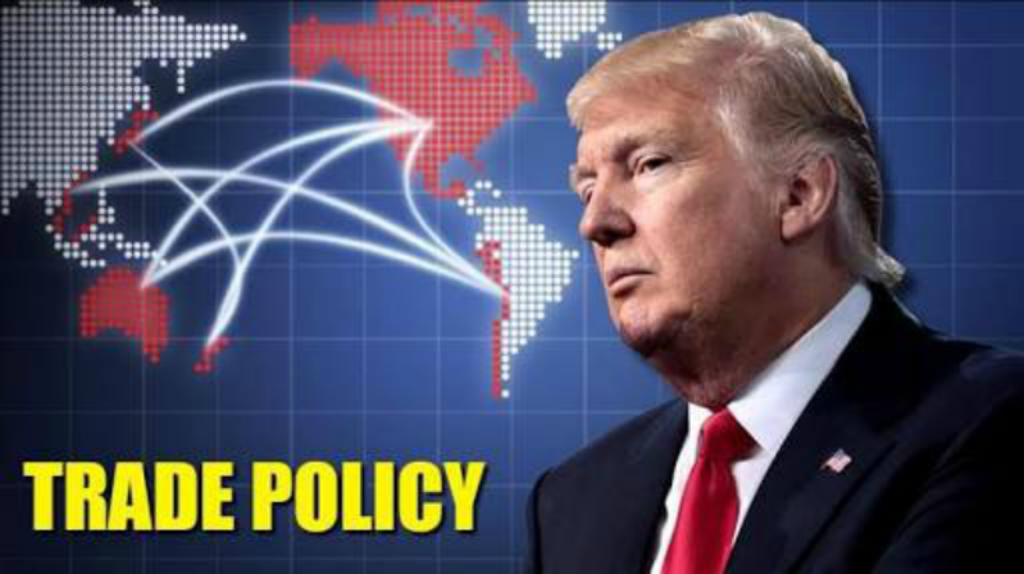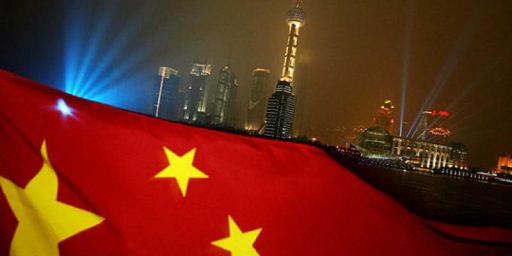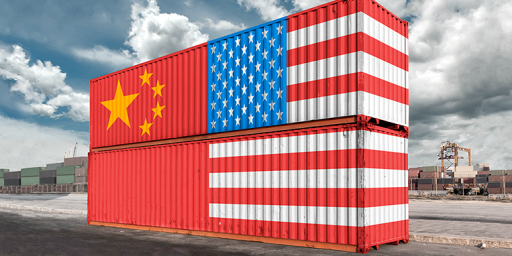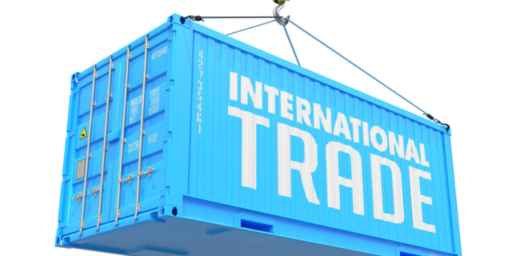Trump’s Trade Policies Have Nothing To Do With Economics Or Reality
Donald Trump's approach to international trade has nothing to with economics and everything to do with politics and the culture war he loves to provoke.

In his latest column at The Washington Post, Robert Samuelson points out something that most of the critics of President Trump’s moves on international trade seem to miss:
You cannot understand President Trump’s so-called trade war without acknowledging that it’s mostly about politics and not about economics. Trump has embarked on a giant marketing campaign to convince us that foreigners — their exports — are to blame for our economic problems. It’s a seductive appeal to nationalism whose main defect is that it’s mostly untrue.
To be fair, Trump’s message has been consistent since the early days of 2016. He said he would slap our trading partners with high tariffs, and so he has. The campaign continues. Here’s a recent tweet: “The U.S. has been ripped off by other countries for years on Trade, time to get smart!”
The standard anti-trade narrative is that U.S. officials have botched trade negotiations, giving too much to foreigners and getting too little for U.S. exporters. Massive trade deficits result and destroy American jobs. The employment loss is aggravated by U.S. multinationals relocating factories to developing countries with their dirt-cheap wages. Low-cost products are then exported back to the United States.
Now, all these statements contain some truth. After World War II, the United States was generous in granting trade concessions to Europe and Japan to help revive their economies. Similarly, many U.S. multinationals do locate factories abroad. These statements are not blatantly false, but their effects are hugely exaggerated.
Take the connection between trade deficits and job loss. Obviously, this occurs for individual factories. But it doesn’t exist for the entire economy. Consider: From 2009 to 2017, the annual U.S. trade deficit for goods and services rose from $384 billion to $568 billion. Over the same years, the number of private U.S. payroll jobs increased by 15.5 million, and the unemployment rate fell from 9.3 percent to 4.4 percent.
If trade deficits created huge job losses, this would be impossible. The main explanation for the apparent paradox is, as I’ve argued for years, that the dollar is the main international currency. Foreigners and investors want dollars to conduct global trade and investment. This keeps the dollar’s exchange rate high, making U.S. exports costlier and imports cheaper. The resulting trade deficit is structural; but Americans’ spending for domestic products is still the main determinant of U.S. employment.
Or take the notion that U.S. multinationals move factories abroad to exploit cheap labor — say, car plants in Mexico. This clearly happens and is routinely reported by the media.
But it is not the main reason that U.S. multinationals invest abroad: 71 percent of their foreign investments occur in developed countries “where consumer tastes are similar to those in the United States,” reports James Jackson of the Congressional Research Service. Europe alone accounted for 59 percent of these investments.
Presumably, it’s less expensive to service these foreign markets from local factories, warehouses and offices than to export from the United States.
Present these facts to the average Trump supporter, of course, and they’ll either ignore you or call you a “globalist” or some other name that they apparently consider a smear. As has been the case since long before Donald Trump came along, the bias against international trade that comes from certain segments of the American public has nothing to do with facts and even less to do with any actual evidence that the arguments they make are even remotely based in either the real world or what economics has been teaching us since Adam Smith wrote The Wealth Of Nations. To a large degree, the opposition is based in the same nationalist, populist mindset that drives those people who are opposed to immigration and who contend that immigrants steal jobs that would otherwise be going to Americans, a fallacy that has been disproven so many times that it’s somewhat astounding that anyone still takes the idea seriously.
In the case of trade, of course, the argument is that trade is a zero-sum game that only one side can win. The reality, of course, is that lower trade barriers are good not only for the companies that import goods into the United States but also for the American economy as a whole including, most notably, American consumers who gain access to a wider variety of goods at a lower price. Additionally, international competition helps the American economy by forcing domestic producers to keep up with competition by improving the quality of their products. The best example of this can be seen in the automobile industry, where the competition from Japan, Europe, South Korea, and elsewhere has only helped to spur companies like General Motors and Ford to improve their products. There was a time when the American auto industry was moribund and, well, just plain uncreative. That process began to end once Detriot figured out that the only way to survive was to learn from Japan and other parts of the world, and as a result, we have a thriving automobile industry that includes not just Detroit, but also plants that build “foreign” cars located throughout the country. Had we closed off the American auto market via high tariffs to “protect” the auto industry, then Detroit would have had no incentive to either shed itself of practices that were stuck in the past or to work to catch up to the new competition. Consumers would have been worse off, and so would have the economy.
As I said, though, none of these facts matter to the opponents of more open trade. In their mind, “foreign” goods are as bad as foreign immigrants. It is not, and never has been, a fact-based argument for most of them and it’s unlikely that any of them are going to be persuaded by yet another treatise on the benefits of free trade, or by the economic statistics that clearly show the benefits that have come from international agreements such as NAFTA or the World Trade Organization. They are propelled by nationalism, fear of the “other,” and by a zero-sum view of economics that assumes that every transaction involves one person who “wins” and another one who “loses.” Trump knows this as much as he knows how well his anti-immigrant rhetoric and his pandering to mindless patriotism over issues such as the N.F.L. National Anthem issue play on an emotional rather than a logical, fact-based level. This is why he’s likely to continue down this road no matter how economically illiterate it may be.






We’re watching a twenty car pile-up on the interstate in real-time here.
Trump is profoundly uninformed.
He operates on an emotional lizard-brain level; complexity and fact have no place in his world.
He wants what he wants and he tenaciously pursues binary deals, ones that have one winner.
You can say that about everything that comes out of this White House.
Making policy based on fiction…what could go wrong?
While your post above is correct, I think you miss the Occum’s Razor explanation.
https://talkingpointsmemo.com/edblog/weve-got-a-problem-a-big-problem
http://nymag.com/daily/intelligencer/2018/06/trump-is-fulfilling-russias-dream-of-splitting-the-west.html
Do you think Russia conspired with Dennison for nothing???
Trump’s trade “policy” reminds me of a quote that’s been attributed to Somerset Maugham and Gore Vidal, among others: “It is not enough to succeed. Others must fail.”
And Trump himself has said that the only good deals are when he wins everything and the other side is crushed. That seems to be his governing philosophy.
I wonder how many of them are driving Toyota Tundras, Nissan Titans, or dare I say it, Ford F250s, Chevy Silverados, or Dodge Rams?
I see a few things conflated in this anti-trade attitude.
To begin with, mistrust or outright rejection of counter intuitive solutions. This can be seen in the view that trade or immigration or jobs are a zero-sum game.
Next, a preference by many people, and here I exempt no one due to ideology, to impose their prejudices over solving a problem.
Third, and most important, there is a stagnation as regards wages, notwithstanding increased productivity, unemployment, etc.
The first two can be dismissed, insofar as they are not substantial objections and don’t need to be considered seriously. The third is real and serious, but it’s unclear how far trade has to do with it (if at all). One can argue that in competing against foreign producers, domestic producers offer lower wages, or don’t increase real wages, in order to keep costs down. One can also argue that the service jobs that replaced manufacturing jobs are inherently less valuable, and thus pay a lower wage as well.
How true the latter two arguments are, I don’t know.
1) Adam Smith was not a free trader.
2) The United States was the most protectionist country in the world for a century, starting with Alexander Hamilton’s Report on Manufactures.
3) The Japanese economy was for decades closed to American automobiles, and they still built Hondas and Toyotas. So it’s difficult to defend the notion that domestic competition is a necessity for innovation.
4) Up to forty percent of cross-border commerical activity with Mexico is intra-corporate, moving a commodity south for assembly and then moving it north for sale. Is that trade?
4a) The above intra-corporate shuffling is zero sum. We gain when we make everything we possibly can in the United States and then import on top of that. When production of a thing shifts from one country to another country and is then imported, that is a net loss of incomes, not to mention the social damage inflicted on the worker, their family and their community.
4b) An economic argument for doing this would be that Mexico has some special advantagr to making the product there, such as a process for assembling cars that is much less energy intensive, or a local material that can make the body stronger and lighter. Cheaper is not economics. Cheaper is profits.
5) It is cheaper to ship bauxite to China and then make things with it. It is not economical to do so because that shipping process generates enormous quantities of pollution and damage to marine life, nor is it economical when China builds hundreds of new coal plants to power their factories.
Profits and economical use of resources are two different things.
We do not have a problem creating wealth in this country, we have a problem distributing it in a way that is reasonably just and which makes the survival of our civilization more likely. But we aren’t supposed to talk about that, so let’s blame some foreigners.
Any time I see Robert Samuelson’s name I feel compelled to point out that he is NOT an Economist. For some reason, possibly nothing more than his name resembling the guy who wrote my Econ 101/102 text, WAPO allows him to play an Economist on their pages.
That said, for once he’s kind of right, Trumpsky is largely doing this for the base. However, everytime he talks about trade deficits it seems clear he thinks it represents profit and loss. If we have a 300 billion dollar trade deficit with Chine they’ve somehow screwed us out of 300 billion dollars, even though we get all those nice clothes and electronics from them. I swear he actually thinks that.
I’m personally running a big trade deficit with Kroger. In fact, they’ve never bought anything from me. I don’t mind.
@gVOR08:
Kroger doesn’t put the dollars you spend into the PBoC’s Federal Reserve account and remove it from circulation.
@gVOR08:
You should see the trade deficit my employer has with me.
@michael reynolds:
Rich people talked dumb poor people into opposing “redistribution”, largely by telling them their tax money would go to pay those lazy blacks to sit around and have babies. But the fact is, free-market capitalism inexorably redistributes money upwards. So a society has a choice: 1) have government tax the winners and redistribute it downwards and create a middle class. This is what europe does. This is what Postwar America did. 2) Let the rich keep everything, and keep getting more of everything, and 90% of the country ends up in poverty, while a handful of families own everything. This is what third-world countries do.
around ~1975ish, the US changed from Option 1, to Option 2, and the next generation that came along, the one I’m in, features a whole bucha educated, indebted people like me, who are markedly worse off than their parents.
This is a point that can’t be stressed enough…there seems to be all kinds of people out there who are worried that the latest generations won’t have it better than their parents, which goes against the recent historical trend…and why is this? It is the issue that so few people want to talk about, as Michael pointed out…
The way I think of trade deficits is this: we’re running a trade deficit because we are generated more wealth than we know what to do with. The deficit, such as it is, is like water spilling over the edges of a fountain that has filled up. And that water, in turns, will fill up other fountains (creating markets for our goods).
The world’s wealth is not our poverty. Someone needs to explain this to Ivanka who can explain it to Jared who can whisper it to Bolton while he sleeps, who can shout it at Hannity who can maybe explain it to Trump one night using stuffed animals and a harmonica.
@Hal_10000: Money isn’t wealth.
@Ben Wolf:
Your opinion of the position of a long-dead pre-modern economist of the 18th century is funny, but not particularly useful
Most? Not by a long-country mile. But regardless, says rather little
Exagerrated asserted anectdotes are not data.
Data rather does confirm competion in an otherwise functional economy does drive innovation. Of course the era cited for the Japanese was not an era of own-innovation, but rather mastering largely existing technology and mastering a degree of process innovation to face the very, very competitive international markets. Compeition to the production markets indeed drove innovation. The clear performance differences between Japanese pure-domestic companies serving non-tradeable markets and those in tradeable markets is stark. Data.
Yes, and?
Innumerate silliness.
There is no rational basis in economic analysis for asserting “zero sum”.
… Cheaper is not economics…
That’s quite amusing.
Completely wrong and … just plain nonsense, but amusing.
The cited issues – allowing for the sake of argument them as facts – are known as ‘externalities’ (external costs to the actions of the specific economic actor) in economic analysis and the preferred and most efficient method of dealing with them is to enforce pricing of the externality.
As it happens, as a general matter sea transport is generally significantly more efficient as a matter of energy consumption per Km/Ton than other, so the mere fact of long-distances does not ipso fact make more polluting.
Firm level profit is indeed not identical to an economy level analysis of efficient resouces, but the two are related – more closely and effectively when there is efficient information avaialble, and most particularly when high cost externalities are obliged to be priced in (as in pollution controls regulation). The Soviets found that out the hard way.
This is not an argument, and if you’d bothered to read the post you might have been aware Doug referenced Smith.
Yes, most. Start with Ha-Joon Chang and we can go from there.
That is incorrect. The Japanese invested heavily in consumer, particularly auto and electronic, technologies during exactly this period. Start with R. Taggart Murphy’s Japan and the Shackles of the Past for an overview.
No. And were you familiar with Smith and Ricardo, and had read the post, I wouldn’t need to address this.
Again, not an argument. A deflection.
To the mentally deficient, perhaps. But it turns out that pricing mechanisms cannot restore a biological system that is dead.
You are confusing money with wealth.
No. The Soviets found out you can only lie to people so long. Allen’s Farm to Factory is a good place for you to start.